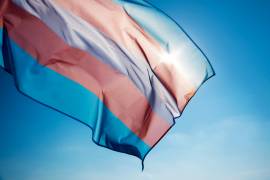
Beyond Marriage: What's Next for the LGBT and HIV Rights Movement
Blog Search
This is the second of a two-part series from a speech delivered April 12 at Princeton University’s Every Voice conference for LGBT and ally alumni.
Previously: Why marriage?
I offer you an imperfect analogy from Lambda Legal’s work on transgender rights.
You may be aware that the Diagnostic and Statistical Manual, what people call the bible of mental health, is being rewritten. Gender identity disorder is being written out, and gender dysphoria written in. Many advocates and members of the trans community feel strongly that being transgender ought not to be listed in a mental health manual in any case. They see the advances since homosexuality was eliminated from the DSM in 1973. They are correct when they point out the mental health diagnosis had combined with laws criminalizing gay sex as the toxic basis for firing people from their jobs, and denying them access to their children.
But we decided that within the health care structure and laws of the United States, we couldn’t advocate for immediately eliminating a diagnosis for transgender people experiencing serious distress that requires medical treatment. I agree that unfortunately there is likely some stigma in a DSM diagnosis. But here, today, and for the foreseeable future, the most vulnerable among us—take, for example, an indigent transgender prisoner whose health care is entirely subject to government control—won’t get care without medical, diagnostic backup.
I can’t in good conscience advocate completely eliminating a listing for transgender people if it means decreasing access to lifesaving health care. A trans prisoner who’s in danger of attempting self-castration because she is denied treatment would rightly condemn me if rather than use a medical diagnosis to fight for her care, I told her to comfort herself with the glory of having been destigmatized, because now there was no leg to stand on in the DSM for her to secure transgender health care. We need to do more work here. And it’s deadly serious.
What else is on the horizon for the LGBT or QUILTBAG movement, beyond marriage?
Creating new family structures ought to be a bigger goal for a wider swath of the population. In terms of the LGBT movement, how about a comprehensive national employment nondiscrimination law for all LGBT people? We have none!
How about access to health care and treatment for transgender people, who often have to resort to dangerous, unregulated black-market products to get what they need to care for their bodies? And how about fighting for the rights of intersex people, born with ambiguous or different genitalia? How about fighting for their right not to be surgically carved up in infancy? Both examples can be explained as brutal gender-norming. Society wants trans and intersex bodies to match stereotypes. In one case, trans adults entirely capable of articulating what they want and need, and consenting to it, are denied. Meanwhile, intersex infants and children without a medical need for surgery have their bodies altered, often sterilized, before they are anywhere near old enough even to understand what’s going on, much less consent. That is vicious gender-norming.
On the trans rights front, every cisgender woman among us, every one of us who identifies our gender as the same one designated for us at birth, every voice, should rise against using ciswomen’s safety in bathrooms as an excuse to discriminate based on gender identity. People prejudiced against LGBT communities—who, by the way, never made a move for women’s safety before—are using us to shield their bigotry against trans people. We must not let them.
How about further exploring and advocating where LGBT and HIV issues intersect with experiences linked to race, class and immigration status? How about dismantling the so-called “school-to-prison pipeline” that disproportionately punishes LGBT and questioning youth and pushes them from learning environments to custodial and punitive ones, and often to the streets?
When I’m asked what’s beyond marriage, I say, “Don’t let up! Let’s win it before we say we’re done and beyond it.” I say that beyond marriage, and even before we’re beyond—in fact, right now, today—we have an explosion of critical LGBT and HIV issues across the rainbow. As advocates, we need to bend that arc of multicolored light toward justice.



